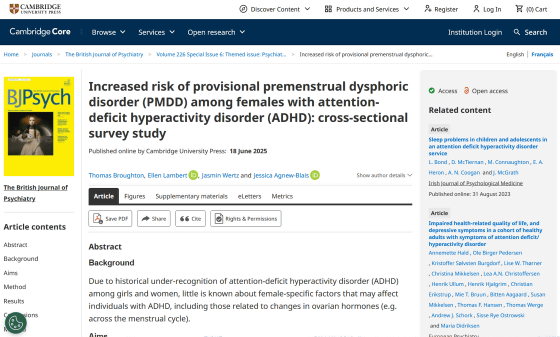Women with ADHD are three times more likely to suffer from premenstrual dysphoric disorder (PMDD), a condition that makes women irritable and anxious before their periods.

Research on
Increased risk of provisional premenstrual dysphoric disorder (PMDD) among females with attention-deficit hyperactivity disorder (ADHD): cross-sectional survey study | The British Journal of Psychiatry | Cambridge Core
https://www.cambridge.org/core/journals/the-british-journal-of-psychiatry/article/increased-risk-of-provisional-premenstrual-dysphoric-disorder-pmdd-among-females-with-attentiondeficit-hyperactivity-disorder-adhd-crosssectional-survey-study/CD1DC6B31D4B009AB04F580C1189BC86

Women with ADHD three times more likely to experience premenstrual dysphoric disorder – new research
https://theconversation.com/women-with-adhd-three-times-more-likely-to-experience-premenstrual-dysphoric-disorder-new-research-260222
PMDD is estimated to affect approximately 3% of women worldwide, and can cause psychological symptoms such as mood swings, irritability, depression, and anxiety before menstruation, which can seriously interfere with daily life. Although symptoms appear a few days before menstruation and subside once menstruation begins, PMDD can also have serious consequences, such as an increased risk of suicide attempts .
To investigate the relationship between ADHD and PMDD, the research team conducted an online survey of 715 women aged 18 to 34 living in the UK. Questions included whether they had experienced symptoms associated with ADHD or PMDD, whether they had ever been diagnosed with ADHD by a doctor, and how these symptoms caused problems in their daily lives.

The analysis showed that approximately 31% of women diagnosed with ADHD by a doctor also had PMDD, and approximately 41% of women with high ADHD symptom scores also had PMDD. Meanwhile, only approximately 9% of women without ADHD symptoms met the criteria for PMDD. Furthermore, women with ADHD who were also diagnosed with depression or anxiety by a doctor were at even higher risk of PMDD.
The most common PMDD symptoms experienced by women were irritability, feeling overwhelmed, and depression. Furthermore, women with ADHD were also more likely to experience insomnia during their PMDD episodes.
While this study is not the first to show a link between ADHD and PMDD, it is the first to show that women with ADHD symptoms, not just those with a doctor's diagnosis, are at higher risk for PMDD.

Previous studies have shown that women with ADHD are at increased risk for mental illness during other periods of hormonal change, such as when they start taking oral hormonal contraceptives, and when they experience higher rates of depression after giving birth than women without ADHD.
More research is needed to understand why women with ADHD are more likely to develop PMDD and what treatments might be effective. Also, because the study relied on self-reporting, it's possible that the prevalence of PMDD may have been overestimated or underestimated.
Jessica Agnew-Blyth, co-author of the paper and senior lecturer in psychology at Queen Mary, University of London , said: 'Our new research shows that women with ADHD are at higher risk for PMDD, particularly if they also have co-occurring depression and anxiety. This suggests that clinicians should consider screening for PMDD in women with ADHD to reduce the distress and poor prognosis associated with the condition.'
Related Posts:
in Science, Posted by log1h_ik







